-
TrackoBit
Manage commercial vehicles with the new-age Fleet Management Software
TrackoBit -
TrackoField
Streamline your scattered workforce with Field Force Management Software
TrackoField -
Features Resources
-
Blog
Carefully curated articles to update you on industrial trends. -
White Paper
Insightful papers and analysis on essential subject matters. -
Glossary
Explore an alphabetical list of relevant industry terms. -
What’s New
Get TrackoBit & TrackoField monthly updates here. -
Case Study
Explore the cases we solved with our diverse solutions. -
Comparisons
Compare platforms, features, and pricing to find your best fit.
-
About Us
Get to know TrackoBit: our team, ethos, values, and vision. -
Careers
Join the most dynamic cult of coders, creatives and changemakers. -
Tech Support
Learn about our technical support team and services in detail. -
Events
Check out the exhibitions where we left our marks and conquered. -
Contact Us
Connect with us and let us know how we can be of service.
What is Sick Leave? Types, Laws & Eligibility Explained
- Author:Nandita Gupta
- Read Time:6 min
- Published:
- Last Update: August 1, 2024
Table of Contents
Toggle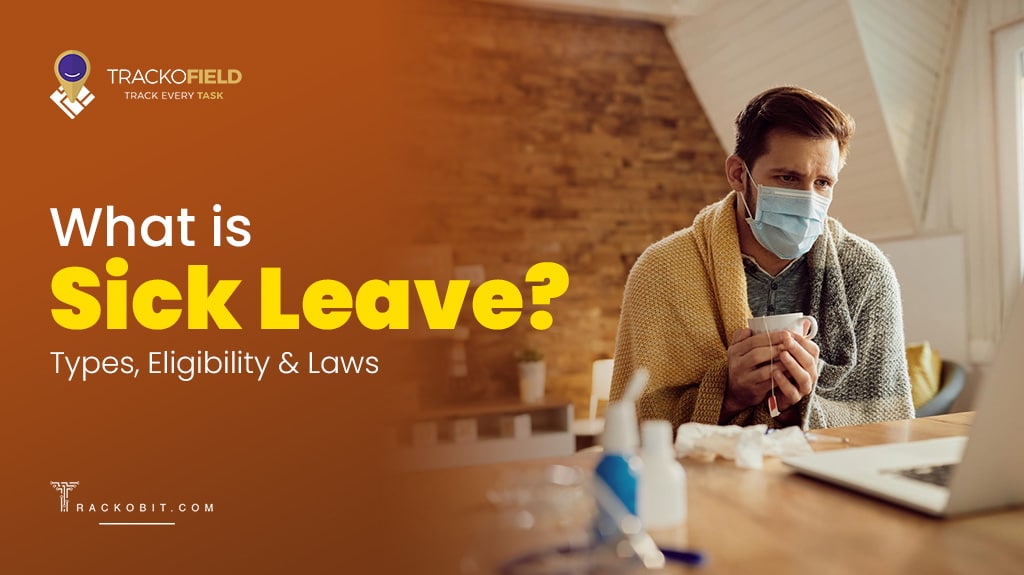
Sick leave is paid time off granted to employees. Read what is sick leave, its laws, the eligibility criteria, and how to manage it with a leave management system.
Table of Contents
Toggle
Achoo… Bless You!
Do you know what these two words mean? Looks like your diligent employee is falling sick.
Sick leaves are uncalled for. One fine day you see an employee all fit and active and another day, they are calling and saying:
“Hello boss, I cannot make it to the office, I am very sick.”
Employee sick leaves are absences from work when employees feel mentally or physically unfit to work around their shift. Organisations are liable to allot a permissible leave quota monthly and sanction it when employees feel the need.
In this guide, we explain the A to Z of sick leave, including what it is, the laws that support it, and the quota a company is eligible to allot. At the bottom, we have suggested the best leave management software to streamline reporting.
What is Sick Leave?
Sick leave is a paid time-off that organizations avail to in-office, remote, and field forces for their physical and even mental illness. Such leaves are often taken on short notice so that employees can rest and respite.
As per Indian laws, employees are obliged to take a maximum of 10-12 sick leaves in a calendar year. However, you will find different private companies flexibly allocating leave quota as per their sick leave rules, policies, and business requirements.
Cases in Which Employees Are Granted Sick Leaves
Sick leaves are permissible only when an employee is battling with the following circumstances:
a) Medical Health Issues
When the employee is unwell to fulfill routine job duties and might be at risk of infecting others with his/her ailment.
b) Injury
When an employee encounters some injury at or outside the workplace can apply for a sick or medical leave.
c) Chronic Medical Condition
When an employee has been suffering from chronic illnesses, such as migraine or asthma are eligible for sick leave.
d) Have Medical Appointments to Take Up
Employers are eligible to take sick leaves in case they have doctor’s appointments, some therapy sessions, or diagnostic check-ups.
e) Mental Health Issues
Employers are granted sick or medical leave when they are undergoing mental illnesses such as anxiety, depression, or burnout due to another serious mental health issue.
f) Contagious illness like Covid -19
An employee can get sick leave when he/she has come in contact with a contagious illness like COVID-19 or chickenpox.
Please note that the reasons for granting leave of absence for sickness can vary from company to company or the nature of employment. It’s best to consult with your HR teams regarding the sick leave rules and policies.
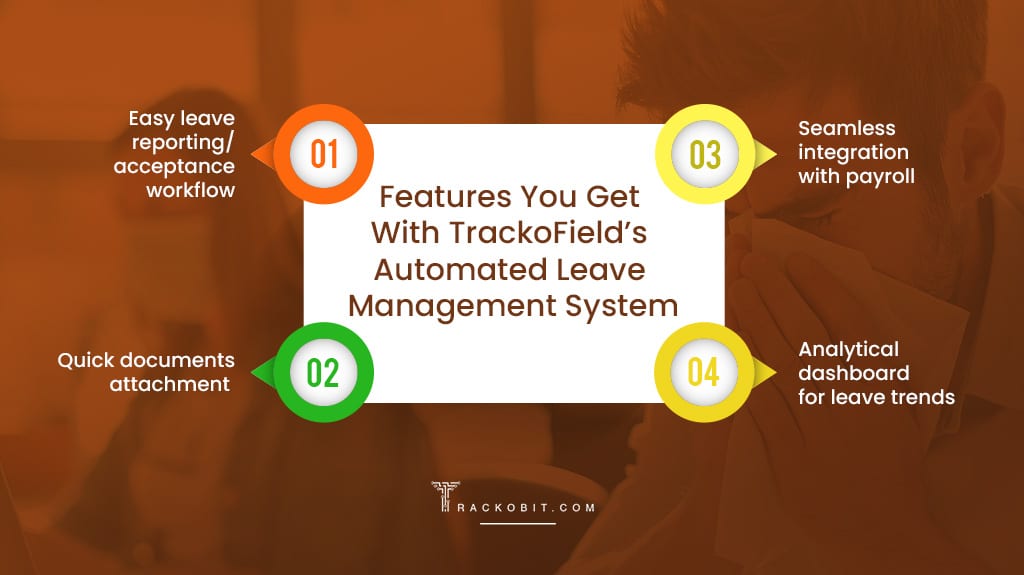
Who All Are Eligible for Paid Sick Leave?
Employees who have worked for at least six months to a year are granted paid sick leave. In most cases, the eligibility of an employee getting sick leave also depends on the size of the company, the employee’s position or job title, category, and employment band.
Sick Leave Criteria for Eligible Employees
- Eligible employees receive 10-13 annual sick leave deposited on the first day of January.
- All 9/10-month employees receive 9 days deposited on the first day of January up to a maximum of 60 days.
- Fixed-term employees receive annual paid sick leave from the onset of their contracts.
Popular Laws Governing Sick Leaves in India
Here are laws that govern sick leaves and related policies for Indian organizations. However, it is best to consult with HR as leave policy and requirements can vary from a private to a government organisation.
| Shops and Establishment Act |
|
| Apprentices Act (1961) |
|
| The Employees’ State Insurance Act, 1948 |
|
| Plantation Labour Act (1951) | Under this act, the sick leave policy is decided as per different companies’ rules and regulations. |
| The Employees’ Provident Funds and Miscellaneous Provisions Act, 1952 | This act deals with employees’ provident fund and involves benefits in the form of leave in case of medical issues. |
| The Maternity Benefit Act, 1961 |
|
| Working Journalists and Other Newspaper Employees and Miscellaneous Provisions Act (1955) | Under this act, employees are eligible for at least one month of sick leave for every 18 months of service. But with the payment of half of their actual salary. |
| The Industrial Employment (Standing Orders) Act, 1946 | This act is specially for industrial establishments and the rules for sick leaves are defined as per this act. |
| The Factories Act, 1948 | The Factories Act involves laws that govern the welfare of the factory workers. The act supports the granting of sick leave to factory workers. |
Sickness Proof – What All Documents Are Required?
The document requirement for employee sick leave varies from company to company and according to their corporate leave policy. Here are some documents that companies commonly ask for:
- The doctor’s note or prescription confirming the illness of the leave applicant along with the dates and duration of the leave.
- Leave application over digital leave management system with the applicant’s name, employee ID, date of absence or joining, and other employee details.
- Some companies prefer detailed formal letters to request sick leave from reporting managers or the HR team.
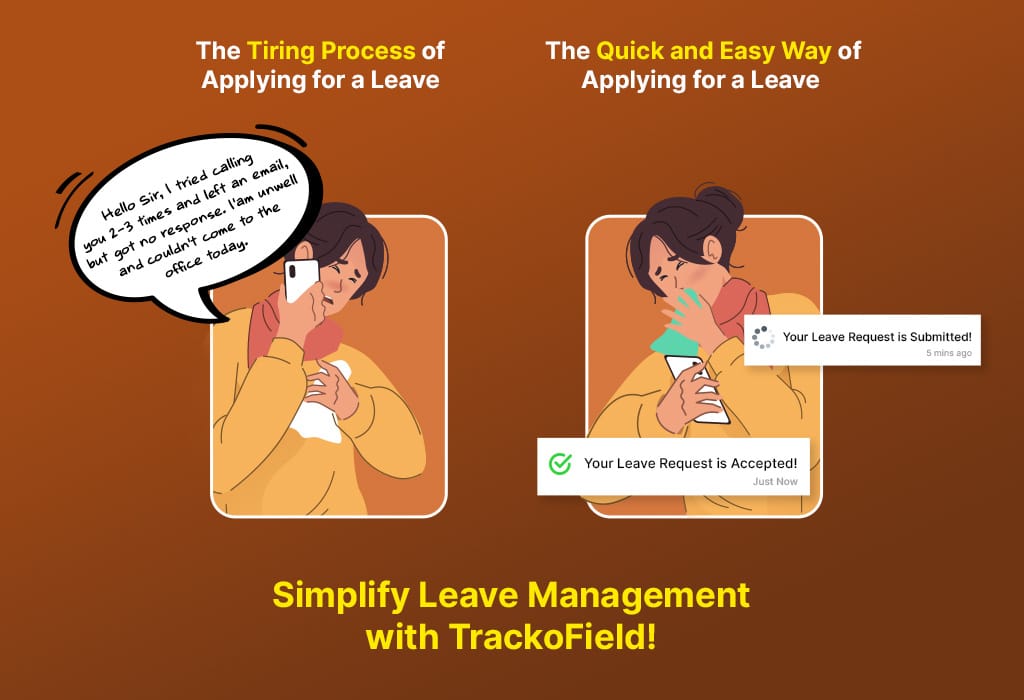
Is Sick Leave the Same as Medical Leave?
Both sick leave and medical leave may seem synonymous, but they aren’t. Medical leave is given for a longer duration when the illness is serious and requires more prolonged attention to treat and cure. For instance, chronic diseases like dengue, chickenpox, surgery, etc. are grouped under medical leave.
Not just for personal well-being, employees can use medical leave to take care of ailing family members. Well, it’s only if the company’s leave policies allow it. Medical leave rules.
are more stringent and require medical documents from a certified medical practitioner.
Manage Leave Requests Without Shortage of Staff with TrackoField
Our leave management software is with you in sickness and in health. It’s time that you say no to the old-school way of configuring leave policies and approving leaves over phone calls.
You deserve a dedicated portal where you can automate leave reporting workflow, auto-define leave criteria and policies, set approval hierarchy, and enjoy a seamless attachment feature for medical proofs. And, most of all, seamlessly compile the leave data for forwarding it to a payroll management system.
TrackoField gives you that much-needed automation.
When you choose us, you also experience:
- Automated carry forward of leave quota
- Updated leave balance per employee
- Analytical data on individual or department-wise leave trends
Some Trending Reads:
- How Does an Online Leave Employee Management Software Work?
- How Does Online Leave Management System Add to HR Efficiency?
- How to Track Remote Workers with Employee Monitoring Solutions?
FAQs on Sick Leave
-
What is sick leave?
Sick leave is a period of absence from work for a short term generally 2-3 days due to poor health.
-
How to ask for leave from the manager?
Every company has different methods to ask permission for sick leave. Most companies require you to draft an email application, while some organisations use a leave management system, wherein employees can send leave requests with just a few clicks.
-
What is the sick leave policy in India?
Under the sick leave policy in India, a minimum of 0.5 to a maximum of seven days (paid) of sick leave is granted by the employers. If the sick leave extends beyond 3 days, the employer has the right to ask for a medical certificate. In most organisations, sick leaves can be appended with earned leaves.
-
What is medical leave?
Medical leave is a period of absence for a prolonged period for a long-term illness like viral fever or any medical condition. The duration of this leave type is usually longer than 2-3 days and requires a medical certificate as proof from a certified healthcare practitioner.
-
How many sick leaves are there in a year?
Most companies typically offer sick leaves ranging from 5 to 15 days. The number of sick leave days differs by country, organization, and employment contract.
-
What is the sandwich leave policy in India?
Under the sandwich leave policy, the leaves of weekends falling between two leave days are also counted for total leaves.
Nandita is the Team Lead for Content Marketing at TrackoBit, bringing over a decade of experience in B2B, B2C, and IoT sectors. She has a proven track record of helping Read More
Related Blogs
-
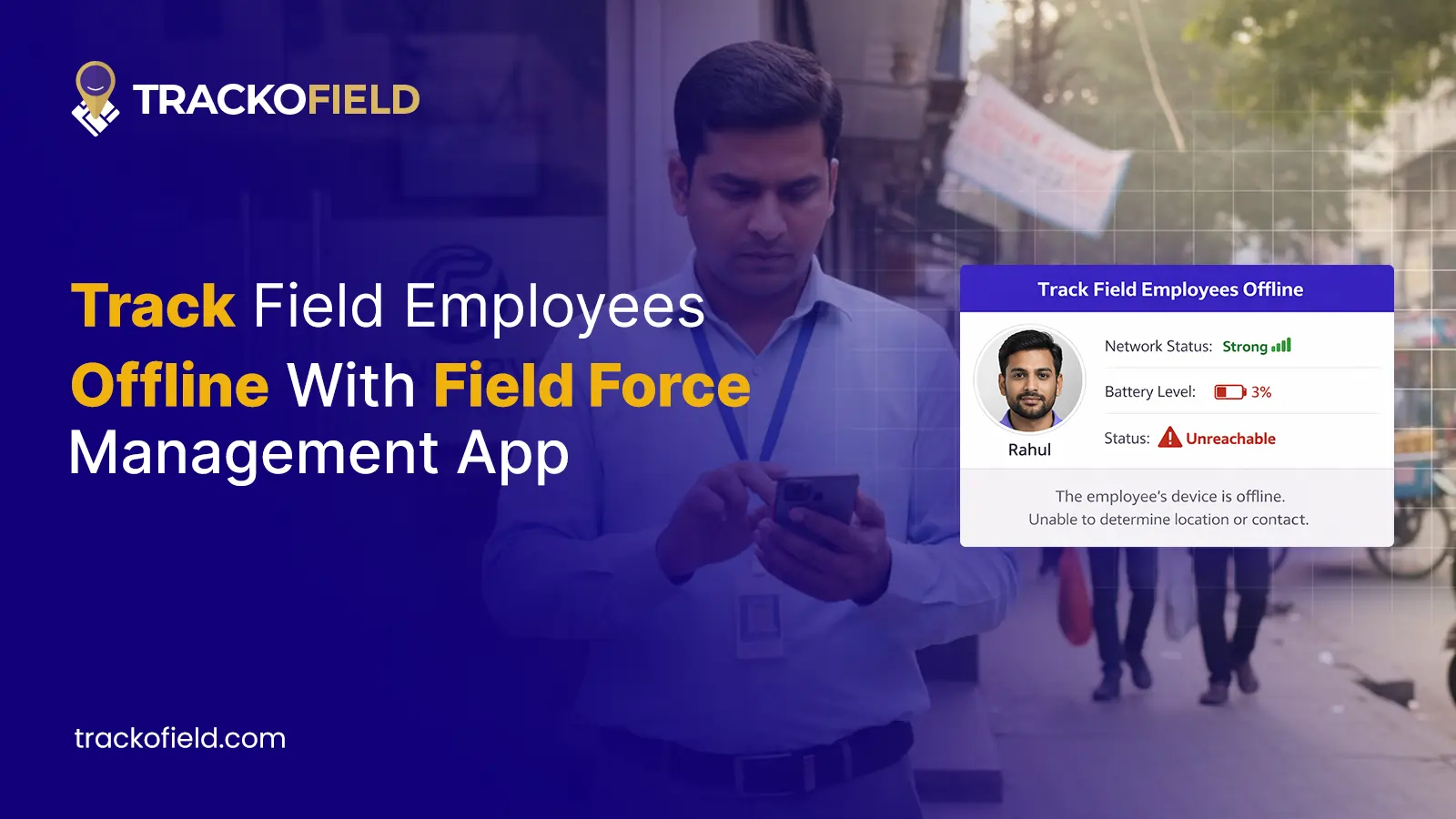
How to Track Field Employees Offline With Field Force Management Software
Mudit Chhikara February 11, 2026Use field force management software to track field employees offline and ensure managers never lose visibility of on-ground operations.
-

How AI-Powered Field Force Management Simplifies Field Operations With Analytical Dashboard
Mudit Chhikara February 10, 2026How AI-powered field force management enhances field operations using AI manager bot and analytical dashboard.
-

Grameen Credit Score and the Quiet Redesign of Rural Lending
Pulkit Jain February 9, 2026Rural lending doesn’t usually go wrong at approval. It drifts when what’s happening on the ground stops being visible.
-
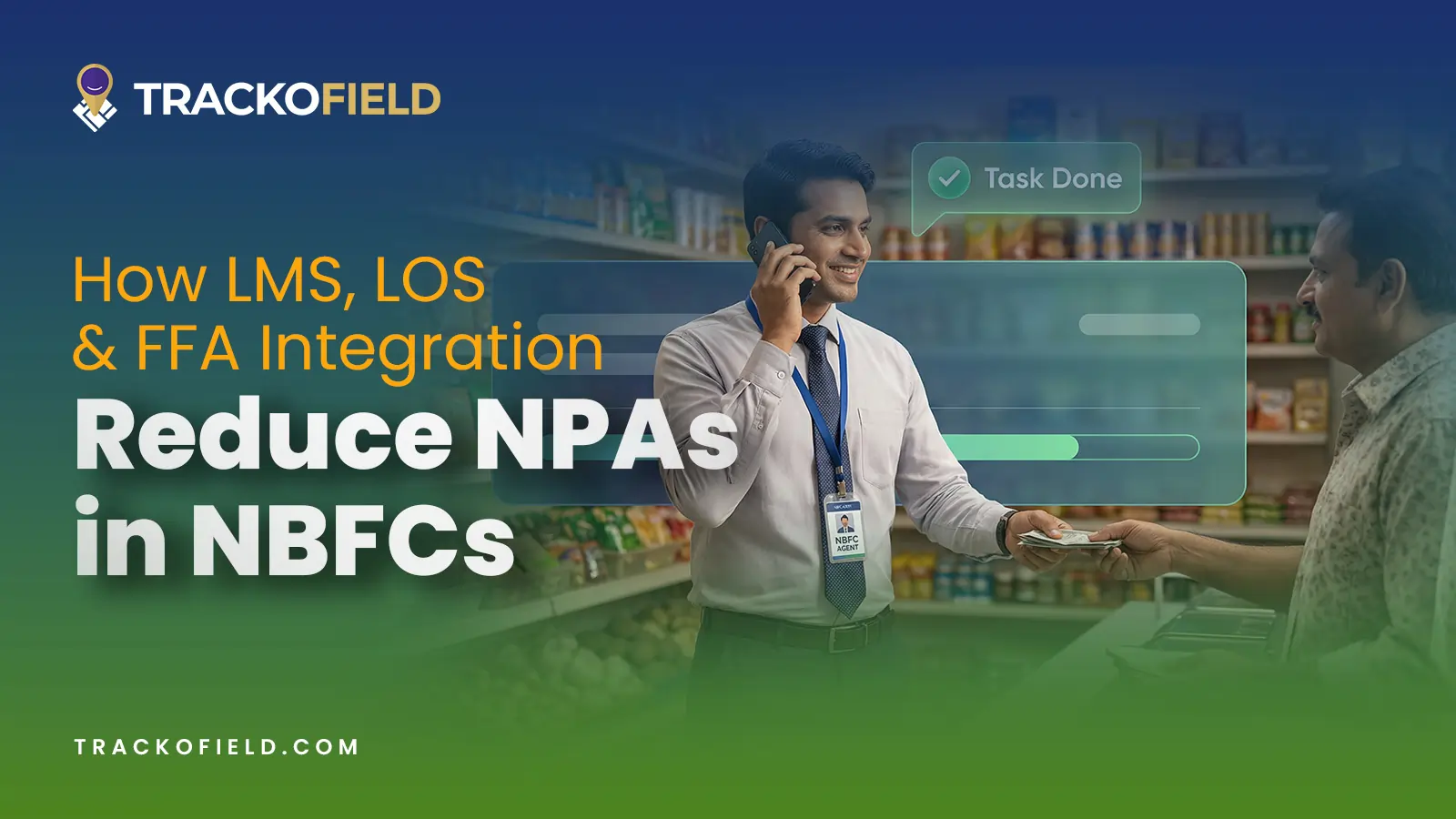
How NBFCs Can Reduce NPAs Using LMS + LOS + FFA Integration
Mudit Chhikara January 30, 2026Here’s how NBFCs can smartly integrate LOS, LMS, and FFA software to reduce NPAs and ensure seamless field operations.

Subscribe for weekly strategies to boost field team productivity.
Your inbox awaits a welcome email. Stay tuned for the latest blog updates & expert insights.
"While you're here, dive into some more reads or grab quick bites from our social platforms!"Stay Updated on tech, telematics and mobility. Don't miss out on the latest in the industry.
We use cookies to enhance and personalize your browsing experience. By continuing to use our website, you agree to our Privacy Policy.






































